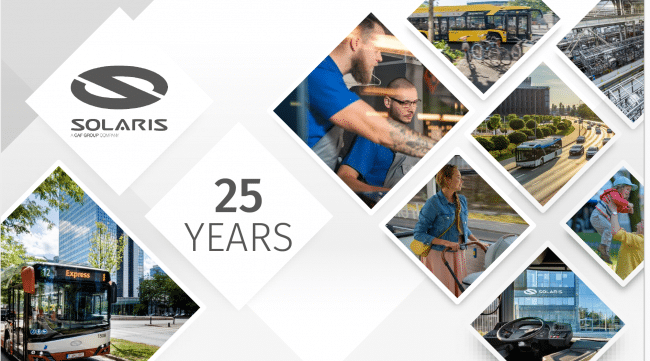Polish bus builder Solaris celebrates 25 years of manufacturing during which time the company delivered almost 20,000 vehicles and operating in 91 cities across 18 countries.
When in business for over twenty years, Solaris left the family ownership of the company to become part of the CAF group in 2018. Speaking at an on-line press briefing, CEO Javier Calleja, said that in spite of 2020 being a very difficult year the company assembled and sold 1,500 buses, significantly more than 2018, (1,226 buses) and only slightly less than in 2019, (1,637 buses) For now, Solaris buses are only available in Left Hand Drive (LHD) but a spokesperson for the company said, “In the short-term there are no such plans and of course, Covid-19 does not help or allow us to take such a strategic decision at the moment, but as in the past Solaris have proven they have the capacity to expand and think beyond boundaries, so who knows.”
Speaking about 2020, the CEO said production continued on site with significant safety procedures in place and most administrators working from home. For Solaris though, safety did not stop at their production facility, anti-virus packages were offered to customers for new and used buses, to help reduce the spread of Covid-19. Including a closed drivers area sealed off, with an intercom for communication with passengers all buses with the enhanced systems have touch free opening and closing doors. On the service front, there are nine service and parts facilities throughout Europe, helping to keep the now 1,000 Solaris e-buses in service. Battery development is high on the development plan, a second life project, for used batteries.
As said earlier Solaris has not entered the RHD market, but in the countries it is present they have good market penetration. In its home market it commands 50% total market share, (97% of ev-market) while in Germany it has 37% of the electric bus market and 70% in Italy. 2021 promises to be better in terms of deliveries and development. While diesel will continue to feature for some time, Solaris say it will not launch new diesel products. One impressive figure presented was an increase of alternative drivelines from 2018 to 2020. In 2018, 29% of the buses manufactured were alternative drivelines, this has increased to 44% by 2020.
Looking to the future Solaris is currently involved in Hydrogen trials at six locations around Europe. Last September, the Urbino 15LE was launched and later this year Urbino 9LE will be introduced. An electric school bus has also been developed. All Solaris buses will have the backup of the eSConnect “remote tool”, which allows, remote vehicle inspection and diagnosis, allowing reports to be created for operators.
Solaris is a very successful company, this success has continued under the new ownership. As market leaders in the electric bus market, it continues to gain market share. Impressively in 2020, in spite of all the challenges of Covid-19, revenue and profitability increased. CEO Javier Calleja concluded by saying that the order book is healthy and they expect deliveries to increase in 2021. With buses in all of the major operators in Europe the Solaris product is well positioned in the marketplace.



